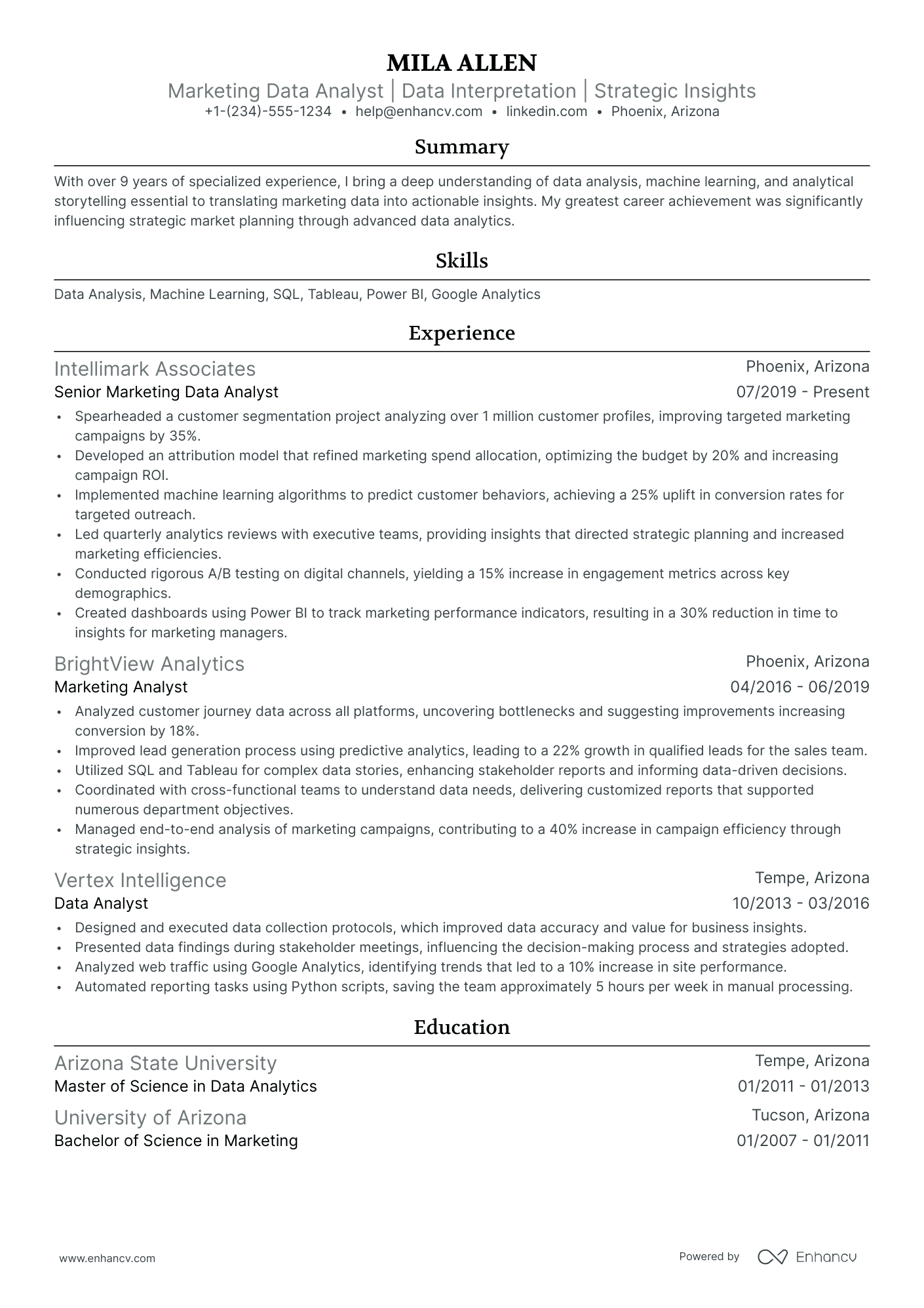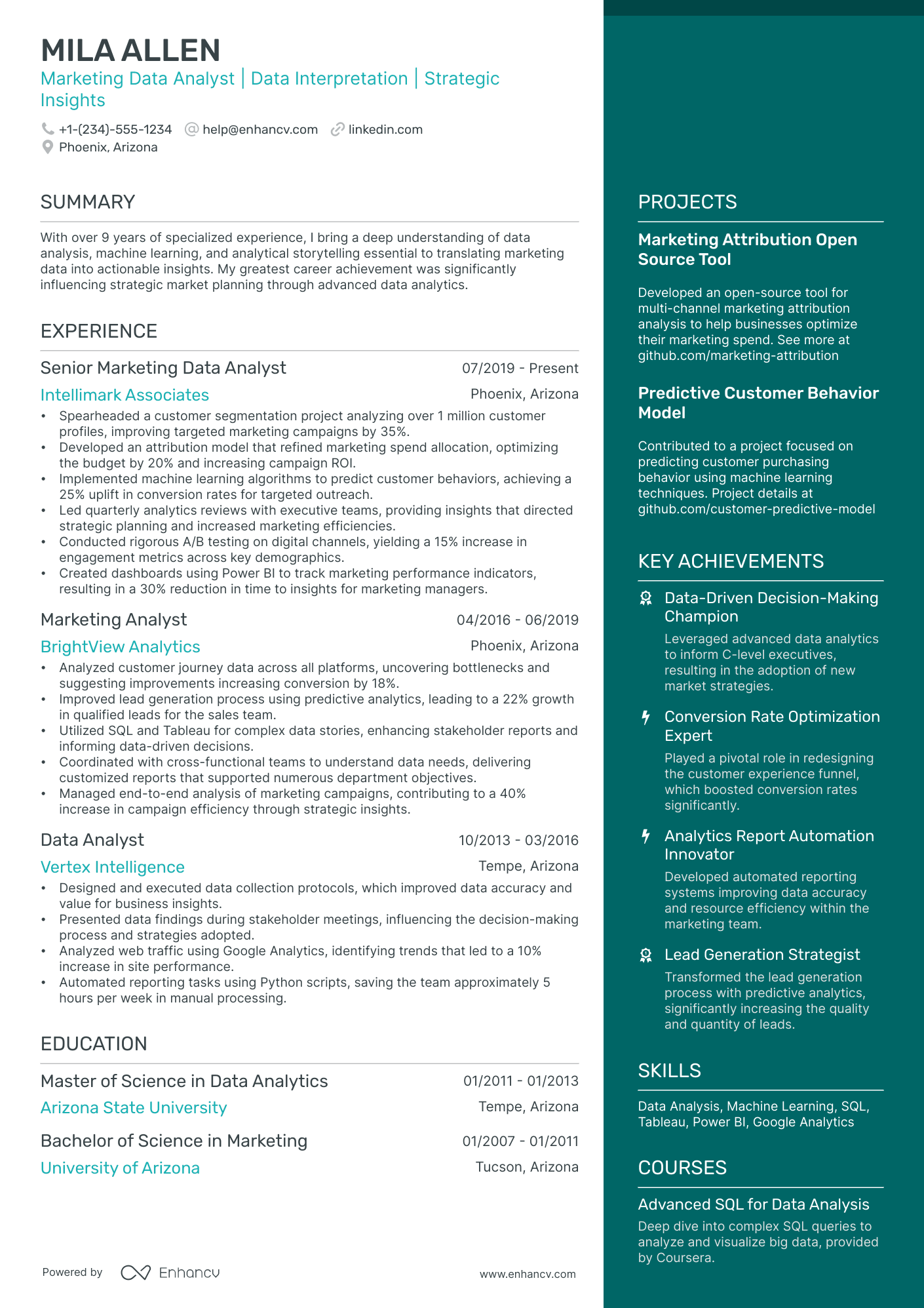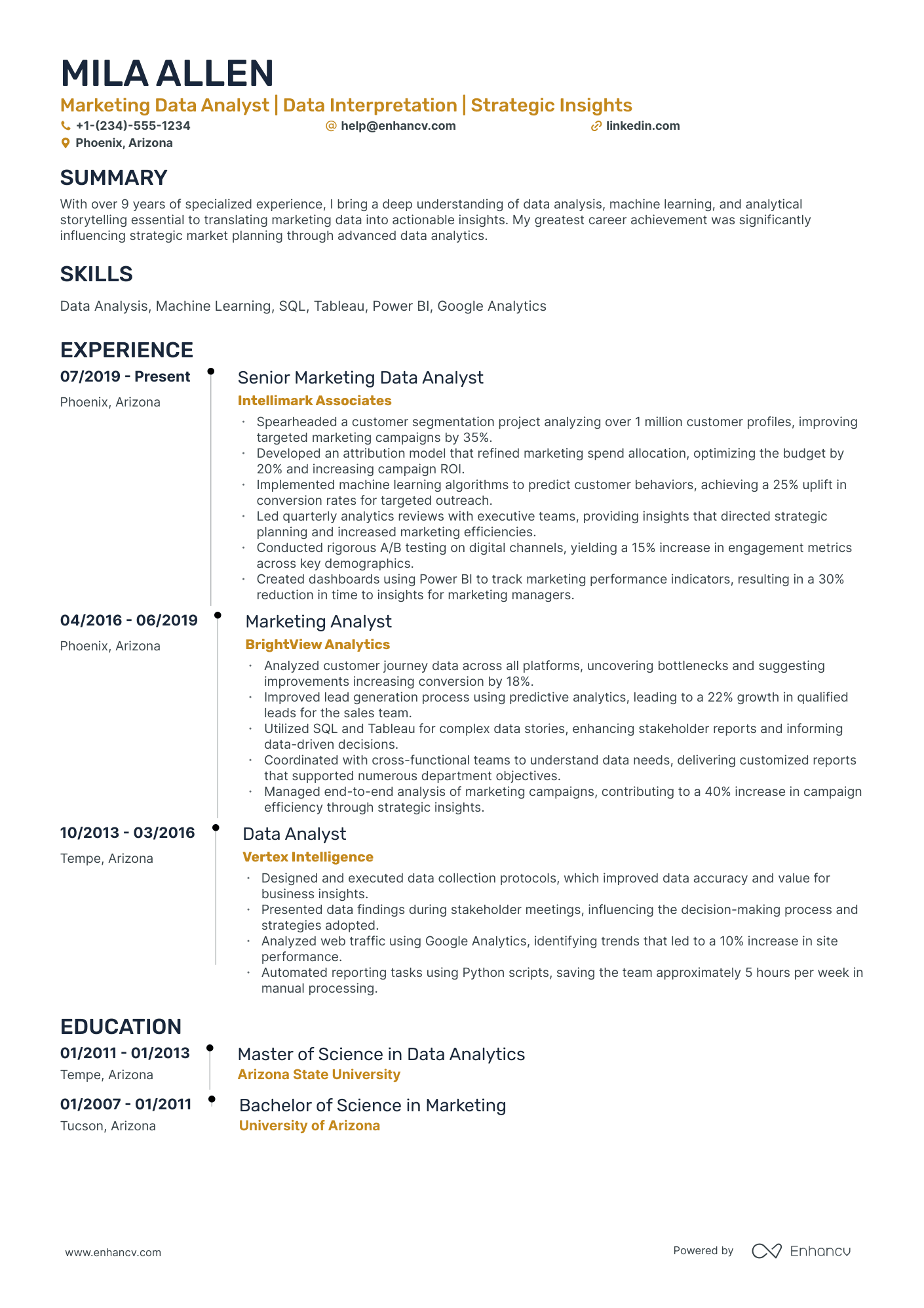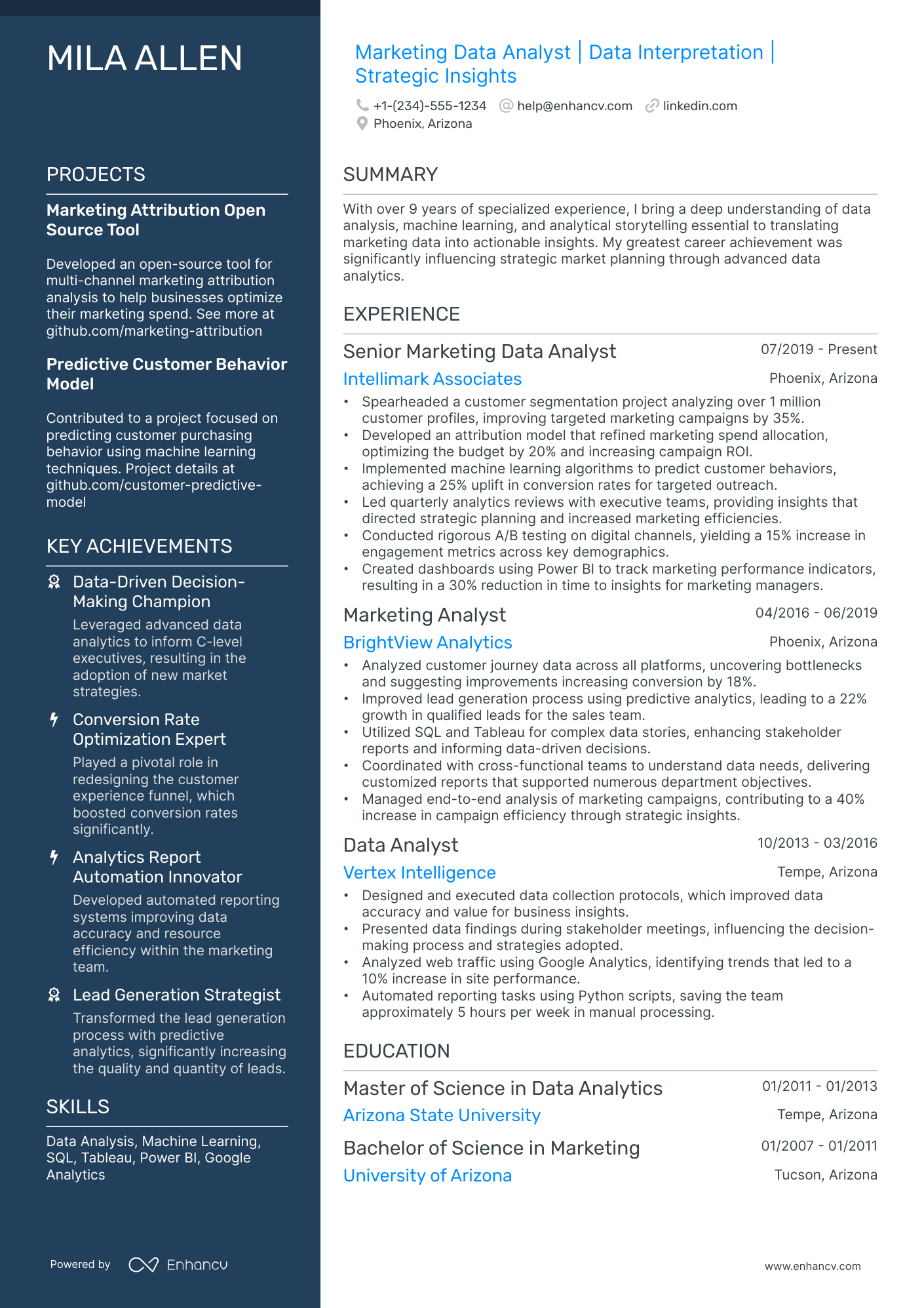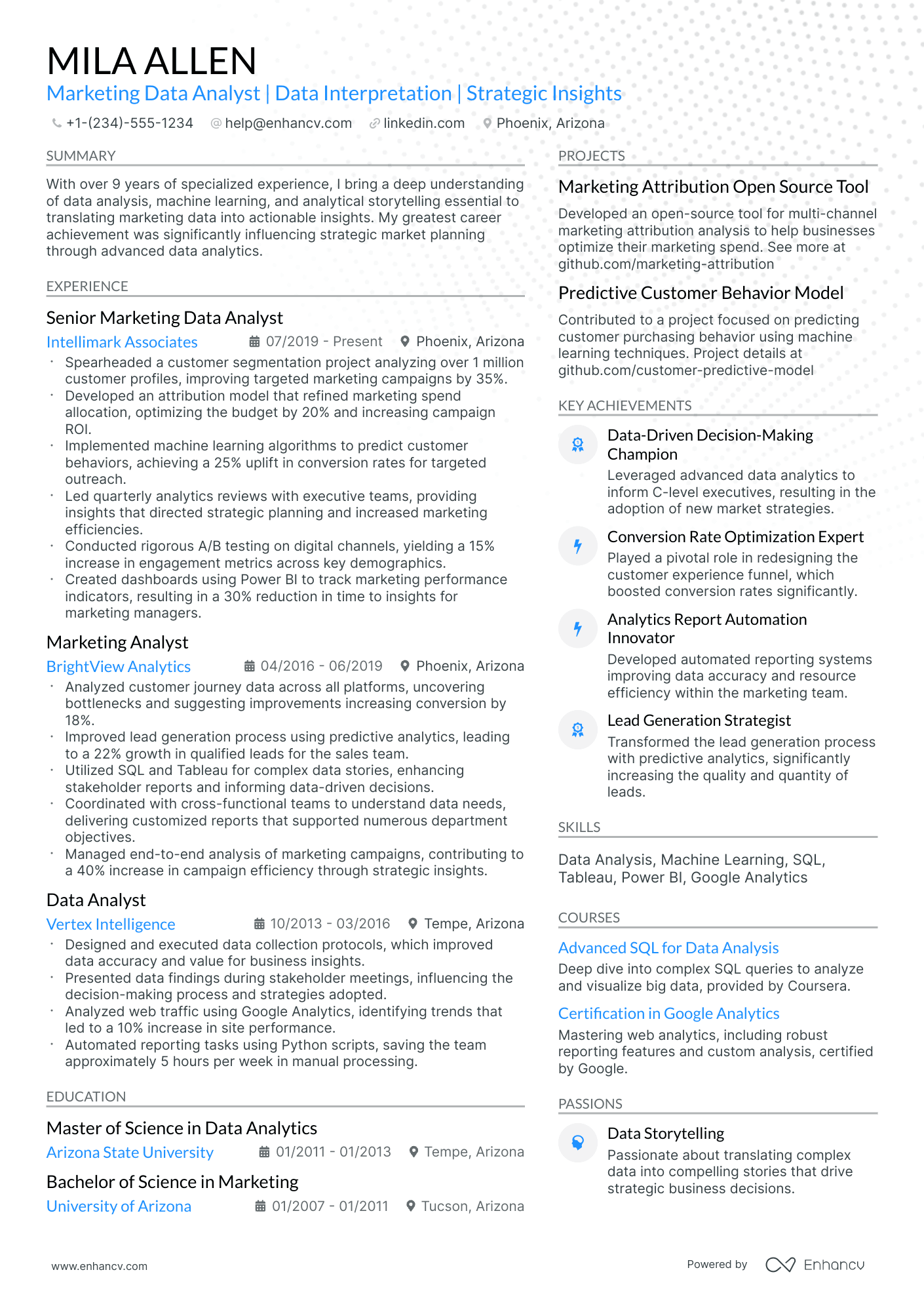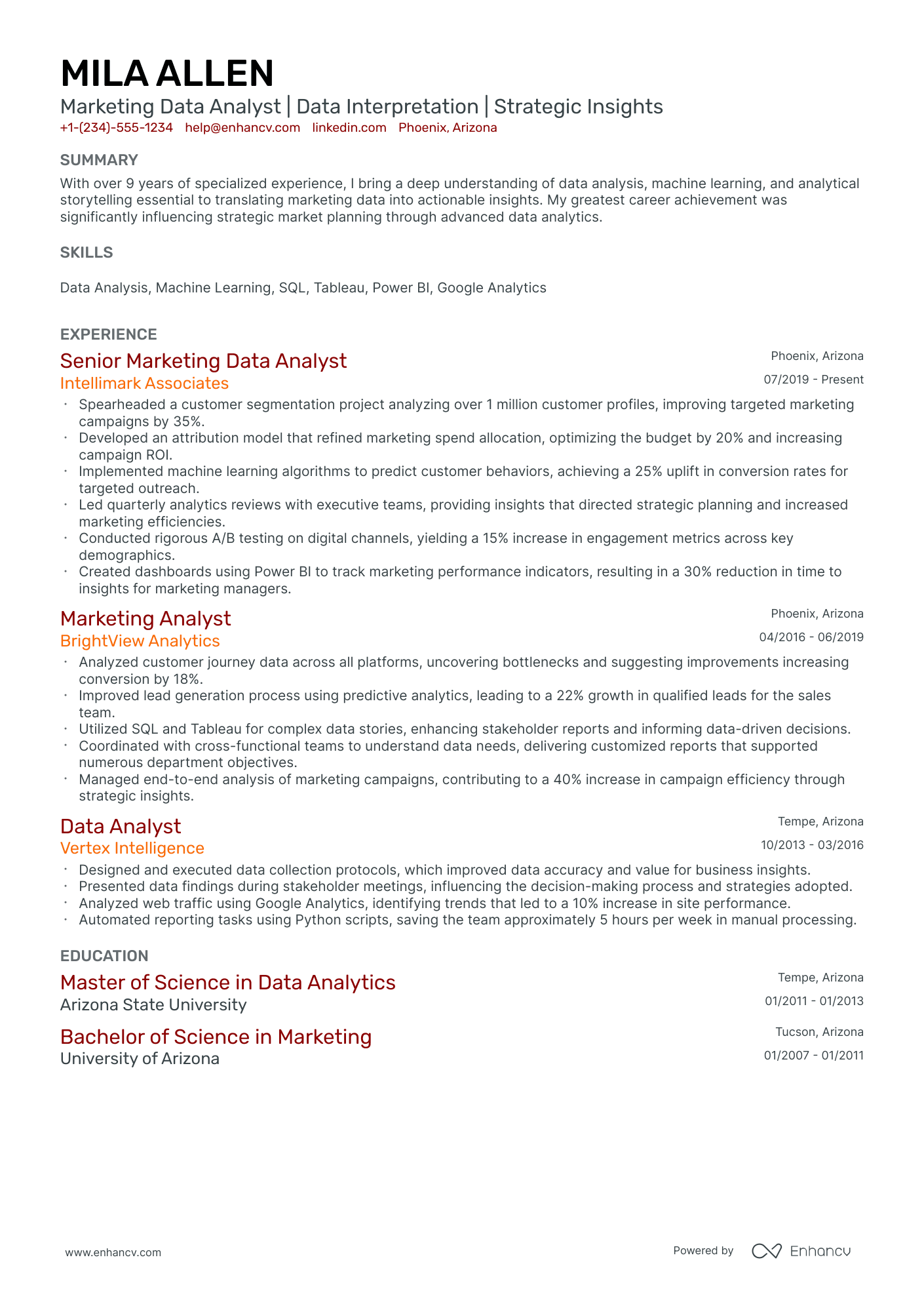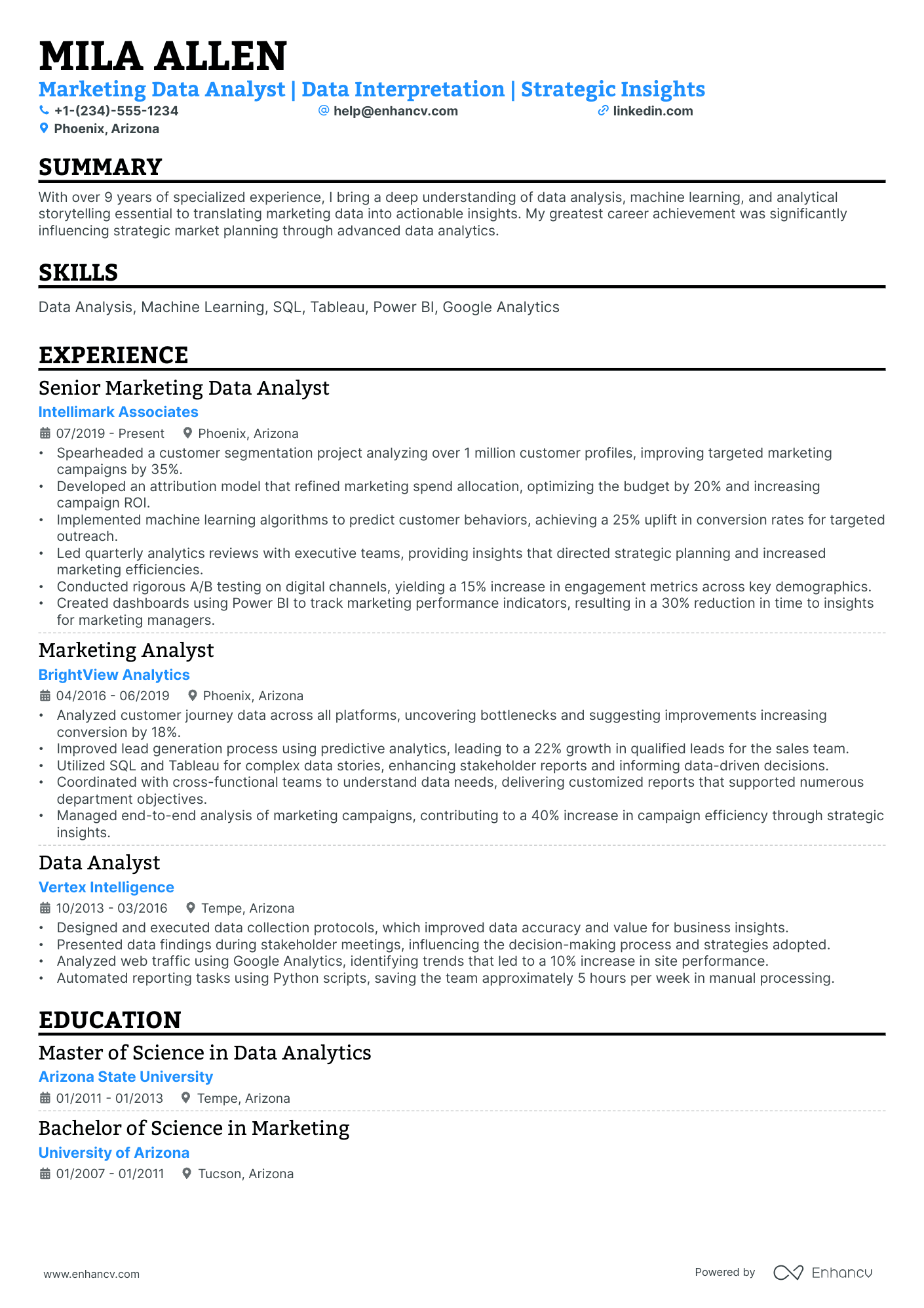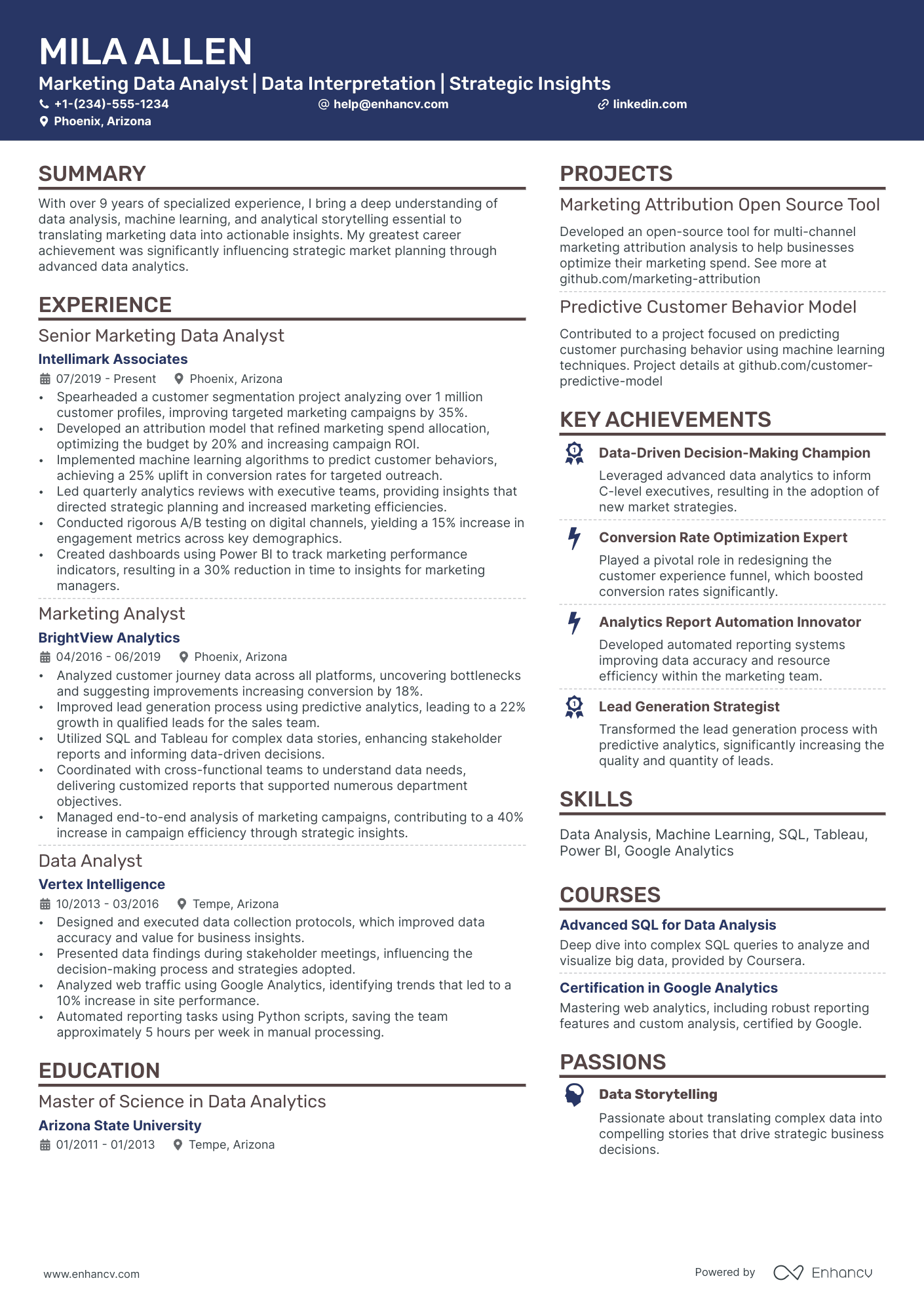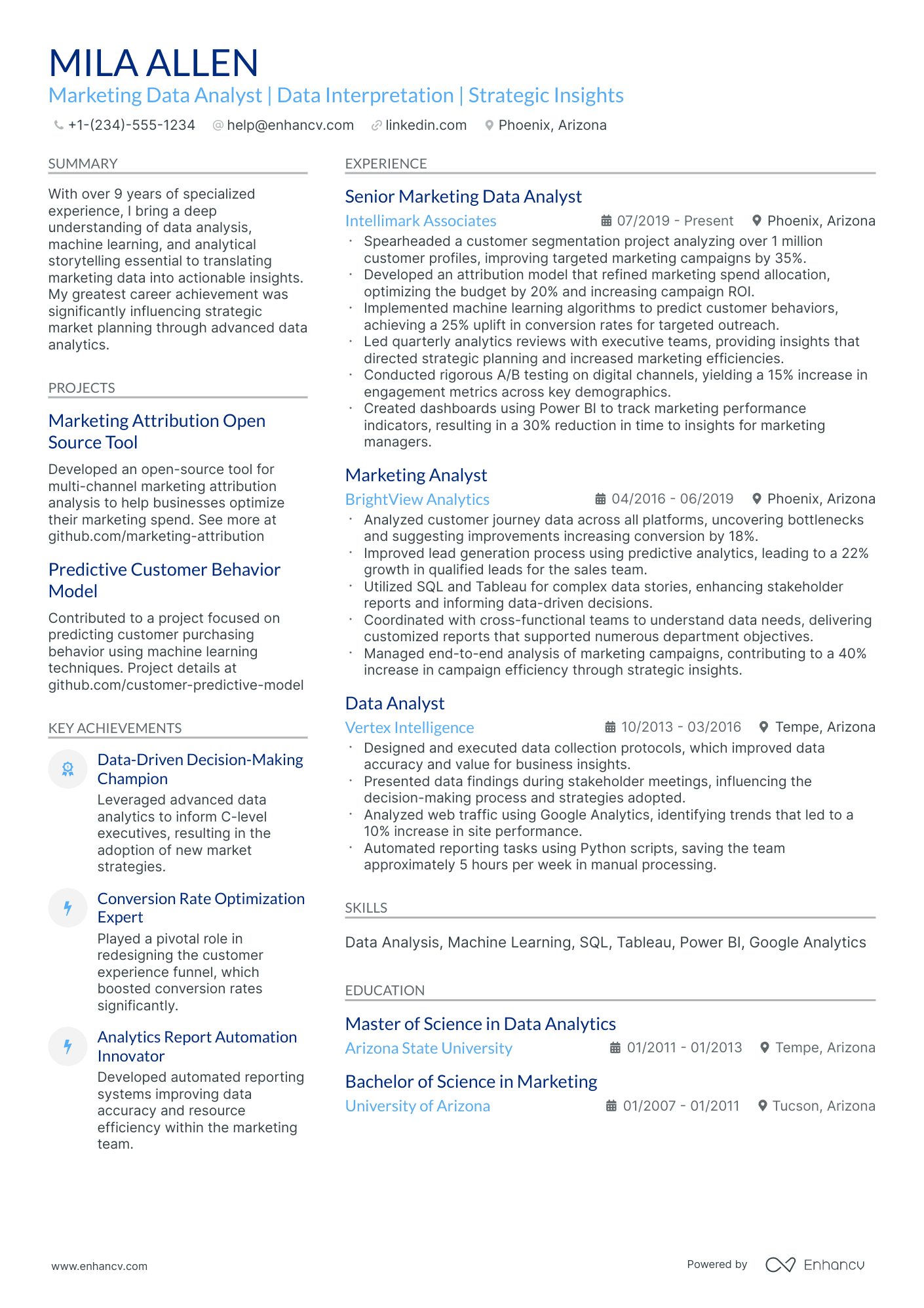Crafting a resume as a marketing data analyst, you might find it particularly challenging to effectively showcase the breadth of your analytics expertise alongside your creative marketing insights. Our guide provides targeted advice to help you balance technical skills with strategic acumen, ensuring your resume makes a compelling statement to potential employers.
- Incorporate marketing data analyst job advert keywords into key sections of your resume, such as the summary, header, and experience sections;
- Quantify your experience using achievements, certificates, and more in various marketing data analyst resume sections;
- Apply practical insights from real-life marketing data analyst resume examples to enhance your own profile;
- Choose the most effective marketing data analyst resume format to succeed in any evaluation process.
Don't stress out over your marketing data analyst resume format
Remember, the elaborate design of your marketing data analyst resume isn't what impresses recruiters most. They are primarily searching for candidates who meet the job requirements. The main aim of your resume should be to clearly and concisely explain why employers should hire you.
Here are four straightforward steps to consider in your marketing data analyst resume design:
- Organize your resume based on experience: Start with your most recent roles. Besides using reverse chronological order, choose jobs relevant to the position you're applying for.
- Include your contact details (and portfolio or LinkedIn link) in your resume's header to ensure recruiters can easily reach you. If considering adding a professional photo, check acceptable practices in different countries first.
- Don't omit essential marketing data analyst resume sections such as the summary or objective, experience, and education. These sections should reflect your career progression and align with job requirements.
- Maintain conciseness in your resume. For those with less than ten years of experience, a one-page format is advisable.
Regarding the format to submit your marketing data analyst resume, PDF is preferable. PDFs are more likely to maintain their formatting when processed through recruitment software or ATS, saving you time in the application process.
When selecting a font for your marketing data analyst resume, consider the following:
- Choose ATS-friendly fonts such as Exo 2, Volkhov, Lato, etc., to keep your resume's content legible;
- All serif and sans-serif fonts are easily readable by ATS;
- While Arial and Times New Roman are common choices, opting for unique typography can help your resume stand out.
Concerned about ATS compatibility with charts and infographics? Our recent study has debunked this and other myths.
Customize your resume for the market – a Canadian format, for example, might vary in structure.
Upload & Check Your Resume
Drop your resume here or choose a file. PDF & DOCX only. Max 2MB file size.
PRO TIP
List your educational qualifications and certifications in reverse chronological order.
Essential sections that should make up your marketing data analyst resume include:
- The header - with your contact details (e.g. email and telephone number), link to your portfolio, and headline
- The summary (or objective) - to spotlight the peaks of your professional career, so far
- The experience section - with up to six bullets per role to detail specific outcomes
- The skills list - to provide a healthy mix between your personal and professional talents
- The education and certification - showing your most relevant degrees and certificates to the marketing data analyst role
What recruiters want to see on your resume:
- Demonstrated expertise in data analysis tools (e.g., SQL, Excel, R, Python, Tableau, Google Analytics).
- Experience with A/B testing and conversion rate optimization.
- Understanding of key marketing metrics and KPIs (e.g., CAC, LTV, ROI, churn rate).
- Proficiency in CRM and marketing automation platforms (e.g., Salesforce, HubSpot, Marketo).
- Capacity to translate complex data findings into actionable marketing strategies.
Adding your relevant experience to your marketing data analyst resume
If you're looking for a way to show recruiters that your expertise is credible, look no further than the resume experience section.
Your marketing data analyst resume experience can be best curated in a structured, bulleted list detailing the particulars of your career:
- Always integrate metrics of success - what did you actually achieve in the role?
- Scan the marketing data analyst advert for your dream role in search of keywords in the job requirements - feature those all through your past/current experience;
- Dedicate a bullet (or two) to spotlight your technical capabilities and how you're able to use the particular software/technology in your day-to-day roles;
- Write simple by including your responsibility, a job advert keyword or skill, and a tangible outcome of your success;
- Use the experience section to also define the unique value of working with you in the form of soft skills, relevant feedback, and the company culture you best thrive in.
Industry leaders always ensure that their resume experience section offers an enticing glimpse at their expertise, while telling a career narrative. Explore these sample marketing data analyst resumes on how to best create your resume experience section.
- Spearheaded a comprehensive analysis of customer segmentation for targeted marketing campaigns, increasing customer retention by 25% over two years.
- Developed an advanced predictive model using machine learning techniques that forecasted sales trends with 95% accuracy, significantly aiding inventory management decisions.
- Collaborated with the marketing team to optimize PPC campaign strategies, reducing cost-per-acquisition by 18% while boosting conversion rates.
- Pioneered a real-time analytics dashboard to monitor campaign performance, which decreased response times for adjusting tactics by 40%.
- Implemented a new A/B testing framework for online ad campaigns that lifted click-through rates by 0.8 percentage points.
- Played a key role in market research projects that informed new product development, leading to the launch of a product line that captured an additional 5% market share.
- Optimized email marketing campaigns through extensive statistical analysis, achieving a 35% improvement in open rates over a six-month period.
- Managed the customer data platform, incorporating user feedback to improve data accuracy and usability, enhancing the marketing team's data-driven decision-making process.
- Led a cross-functional team to identify and rectify a 20% discrepancy in lead attribution, significantly improving the ROI of multi-channel marketing efforts.
- Conducted an in-depth analysis of social media engagement metrics, which informed a strategic content shift resulting in a 50% increase in follower engagement.
- Evaluated customer lifecycle and churn data to identify critical points for intervention, proposing solutions that reduced churn by 10% annually.
- Masterminded a seasonal sales data analysis that identified a 15% untapped opportunity in off-peak periods, guiding the strategy for year-round marketing efforts.
- Integrated multiple data sources into a unified analytics platform, which streamlined reporting processes and saved over 20 man-hours per week.
- Collated and transformed complex customer interaction data to craft personalized marketing strategies, contributing to a 22% increase in campaign response rates.
- Authored a detailed market segmentation report which identified three previously neglected customer segments, leading to a tailored marketing approach and a subsequent 12% revenue increase.
- Introduced a geo-analysis of sales data that pinpointed underperforming regions, addressing them with targeted campaigns that reversed a trend of negative growth in those areas.
- Leveraged advanced Excel functions to automate the creation of monthly marketing metrics reports, reducing preparation time by 50%.
- Analyzed customer feedback and online behavior to refine user personas, which were utilized to increase marketing message relevance and drive a 30% uplift in customer engagement.
- Directed a large-scale data cleanup initiative that enhanced the integrity of CRM data, enabling more accurate targeting and a 20% increase in lead generation efficiency.
- Implemented a conversion rate optimization project using data analysis, which resulted in increasing the e-commerce conversion rate by 1.2% in one fiscal quarter.
- Facilitated the transition to a data-centric marketing approach that recognized a 5% overall increase in marketing driven revenue attributable to enhanced data analytics practices.
- Enabled executive stakeholders to make data-informed decisions by providing nuanced marketing spend analysis which uncovered a 30% budget inefficiency.
- Designed and executed a multivariate testing strategy that raised user engagement on the company website by 20%, directly impacting lead quality and volume.
- Established a comprehensive KPI framework that aligned with strategic marketing objectives and provided transparent performance tracking across all channels.
Quantifying impact on your resume
- Include precise figures to show the amount of data you’ve analyzed to demonstrate the scale of work you can handle.
- Detail the specific percentage increases in lead generation or conversion rates resulting from your analysis to showcase direct business impact.
- Enumerate any revenue growth achieved through your marketing campaign optimizations to highlight your contribution to profitability.
- List the number of A/B tests you have conducted and the quantifiable improvements that ensued to show expertise in experimentation and data-driven decision-making.
- Mention the size of datasets you've worked with, like handling data comprising millions of records, to underscore your technical competencies.
- Showcase any efficiency improvements, such as reducing report generation time by a certain percentage, to prove your process optimization skills.
- Quantify the number of reports or dashboards you've developed and their adoption rate within the company to illustrate your influence on business strategy.
- Present any statistic improvements in customer satisfaction or engagement metrics due to your insights, to display your customer-centric analysis.
Action verbs for your marketing data analyst resume
Experience section for candidates with zero-to-none experience
While you may have less professional experience in the field, that doesn't mean you should leave this section of your resume empty or blank.
Consider these four strategies on how to substitute the lack of experience with:
- Volunteer roles - as part of the community, you've probably gained valuable people (and sometimes even technological capabilities) that could answer the job requirements
- Research projects - while in your university days, you may have been part of some cutting-edge project to benefit the field. Curate this within your experience section as a substitute for real-world experience
- Internships - while you may consider that that summer internship in New York was solely mandatory to your degree, make sure to include it as part of your experience, if it's relevant to the role
- Irrelevant previous jobs - instead of detailing the technologies you've learned, think about the transferable skills you've gained.
Recommended reads:
PRO TIP
If you're in the process of obtaining your certificate or degree, list the expected date you're supposed to graduate or be certified.
Marketing data analyst resume skills: the essential hard skills and soft skills checklist
Ultimately, your marketing data analyst resume should hint to recruiters that you possess an array of talents that are indispensable to the role.
For example, listing the technologies and software you're apt at using (or your hard skills) and how you apply them in your day-to-day responsibilities would ensure you meet the technical requirements of the role.
But is this enough to ensure that you make a good impression on recruiters?
Go a step further by detailing the soft skills or personality traits you've attained thanks to your work and life experience.
The best way to balance hard skills and soft skills on your marketing data analyst resume is by:
- Highlighting up to three of your most noteworthy career accomplishments in a separate section.
- Listing at least one hard skill and one soft skill you've used to solve a particular challenge or problem.
- Feature niche skills and technologies that would help you stand out amongst candidates.
- Think back on the social impact your efforts have had towards improving the work environment - were you able to always maintain a professional ethic, while enhancing the team culture? Write about your contribution to the role, department, or organization itself as a metric of success.
The skills section of your resume provides you with plenty of opportunities to detail your technical and personal traits.
All you have to do is select the talents that best fit your application and expertise. Make note of some of the most prominent hard and soft skills across the industry from our list:
Top skills for your marketing data analyst resume:
Google Analytics
SQL
Excel
Tableau
Python
R
CRM software (e.g., Salesforce)
A/B testing tools
Data visualization tools
Marketing automation tools
Analytical thinking
Attention to detail
Problem-solving
Communication
Collaboration
Time management
Critical thinking
Adaptability
Creativity
Data storytelling
PRO TIP
Mention specific courses or projects that are pertinent to the job you're applying for.
Qualifying your relevant certifications and education on your marketing data analyst resume
In recent times, employers have started to favor more and more candidates who have the "right" skill alignment, instead of the "right" education.
But this doesn't mean that recruiters don't care about your certifications .
Dedicate some space on your resume to list degrees and certificates by:
- Including start and end dates to show your time dedication to the industry
- Adding credibility with the institutions' names
- Prioritizing your latest certificates towards the top, hinting at the fact that you're always staying on top of innovations
- If you decide on providing further information, focus on the actual outcomes of your education: the skills you've obtained
If you happen to have a degree or certificate that is irrelevant to the job, you may leave it out.
Some of the most popular certificates for your resume include:
The top 5 certifications for your marketing data analyst resume:
- Google Analytics Individual Qualification (GAIQ) - Google
- Certified Analytics Professional (CAP) - INFORMS
- Facebook Certified Marketing Science Professional - Facebook
- HubSpot Content Marketing Certification - HubSpot Academy
- Tableau Desktop Certified Associate - Tableau
PRO TIP
If you happen to have some basic certificates, don't invest too much of your marketing data analyst resume real estate in them. Instead, list them within the skills section or as part of your relevant experience. This way you'd ensure you meet all job requirements while dedicating your certificates to only the most in-demand certification across the industry.
Recommended reads:
The marketing data analyst resume summary or objective: integrating keywords, achievements, and more
Deciding whether to include a resume summary or an objective in your marketing data analyst resume is crucial. Both serve as key introductory elements at the top of your resume, encapsulating your profile in up to five sentences and incorporating relevant keywords from the job advert.
Here are the key differences between the two:
- The resume summary focuses on aligning your achievements and experience with the job requirements. It provides recruiters with a snapshot of your expertise, helping you stand out as an ideal candidate for the role.
- The resume objective, on the other hand, centers on your career goals and aspirations, detailing how the role aligns with your career progression. It's particularly suitable for candidates with less professional experience or those new to the job market.
Below are examples demonstrating best practices in utilizing the resume summary and/or objective to make a strong first impression with your marketing data analyst resume.
Resume summaries for a marketing data analyst job
- Seasoned marketing data analyst with over 5 years of experience honing the skill of interpreting complex datasets to drive successful marketing strategies for a leading e-commerce brand. Expert in SQL, Tableau, and Python with proven success in boosting online sales by 30% via targeted data-driven campaigns.
- Dedicated former finance professional with a keen interest in leveraging analytical skills towards marketing insights, armed with an MBA and proficiency in data visualization tools such as Power BI and Google Analytics. Eager to apply quantitative acumen to translate market trends into actionable marketing tactics.
- Skilled data analyst with a strong background in applied mathematics, transitioning into marketing analytics with the aim to optimize product positioning and market penetration. Solid proficiency in R and Adobe Analytics, coupled with a passion for consumer behavior analysis.
- Highly analytical recent graduate with a Bachelor’s in Marketing Management and a strong foundation in statistical analysis and predictive modeling. Enthusiastic about starting a career in marketing analytics, offering a fresh perspective and a dedication to uncovering insights that drive business growth.
- Seeking to apply a deep understanding of data analysis within a new realm, this former software developer possesses extensive experience with Java, R, and data modeling. An eager learner ready to translate technical expertise into the realm of market analysis and customer segmentation.
- Recent graduate with an honors degree in Statistics eager to embark on a data-driven marketing journey, bringing a passion for pattern recognition and predictive analysis. Resolute in the goal to identify market opportunities and inform strategic decisions through data interpretation and analytical rigor.
Optimize your resume summary and objective for ATS
Drop your resume here or choose a file.
PDF & DOCX only. Max 2MB file size.
Other marketing data analyst resume sections to support your expertise and skills
Recruiters are always on the lookout for that marketing data analyst candidate who brings about even more value to the role.
This can be either via their personality or additional accreditations they have across the industry.
Add to your resume any of the four sections that fit your profile:
- Projects for your most impressive, cutting-edge work;
- Awards or recognitions that matter the most;
- Publications further building up your professional portfolio and accreditations;
- Hobbies and interests to feature the literature you read, how you spend your time outside of work, and other personality traits you deem may help you stand out .
Key takeaways
We've reached the end of our marketing data analyst resume guide and hope this information has been useful. As a summary of our key points:
- Always assess the job advert for relevant requirements and integrate those buzzwords across various sections of your marketing data analyst resume by presenting tangible metrics of success;
- Quantify your hard skills in your certificates and skills section, while your soft skills in your resume achievements section;
- Ensure you've added additional relevant experience items, such as extracurricular activities and projects you've participated in or led;
- Use both your resume experience and summary to focus on what matters the most to the role: including your technical, character, and cultural fit for the company.
